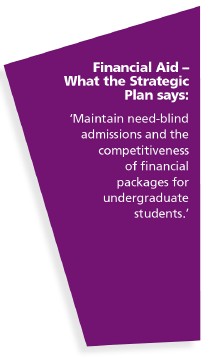COVER STORY SIDEBAR


Uchenna Agbim '13 See larger image
Uchenna Agbim '13 is just one of nearly 8,200 Ithaca campus undergraduates receiving some form of financial aid, many of whom would not be able to afford to attend Cornell were it not for the many sources of help available.
First, a Jane Brody Cornell Tradition Fellowship (named for the New York Times medical columnist and Cornell alumna) has made it possible for her to begin achieving her ambition of a medical career. Then there is a Cornell Academic Competitive Grant, as well as federally funded work study and a federal Pell grant.
Together, these grants are helping create the next generation of alumni who have ambitious goals for what they want to contribute to the world, including future alumna Agbim. A native of Lagos, Nigeria, she moved with her family to Vienna, Va., when she was a child.
"There are a lot of students with really high ambitions, who know what they want to do in life and are ready and willing to work hard, but they're just not able to afford [Cornell] financially," says Agbim, a human development major who hopes to become a surgeon. "The [fellowship] helps them to do what they want to do. It helps future generations and helps bring you doctors, lawyers, teachers and all types of people, so it's very important."
Cornell Tradition is an alumni-supported program that awards 500 fellowships each year to students who demonstrate academic achievement, significant work experience, and a commitment to volunteer service on campus and in the Ithaca area or their home communities.
Direct Cornell financial aid is granted on the basis of need after students have been admitted to the university based on their qualifications, without regard to their ability to pay. Under this "need-blind" admissions policy, Cornell crafts individual aid packages to meet each student's needs.
In 2008, President David J. Skorton announced a significant expansion of undergraduate financial aid in order to make Cornell more affordable for students from low- and middle-income families. At an additional cost of approximately $35 million annually, Cornell is limiting, or even eliminating, need-based loans for qualified students and the expectation of contributions from their families. For example, a student whose family income is less than $50,000 receives an aid package that is a combination of grant aid and work study that at graduation leaves the student free of debt. For students with annual family incomes of between $50,000 and $120,000, the new aid plans cap student debt at $3,000 a year, or $12,000 after four years.
Without financial aid, Agbim realizes, she would not be a part of a community she cares about -- one that offers both academic rigor and mutual support, where "everyone seems willing to open up and be there for each other."
She says: "Cornell is a well-known, prestigious institution, but it's the people that make it great to be here. There are so many places and opportunities to meet people from all over the world, and I've met people I feel will be my friends for a long time."
